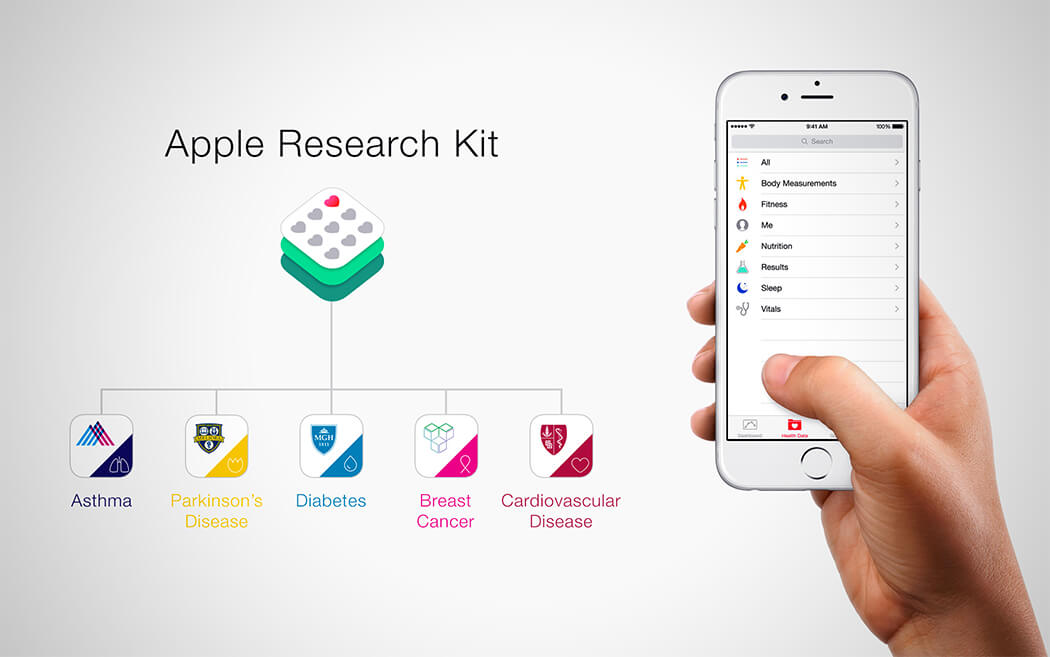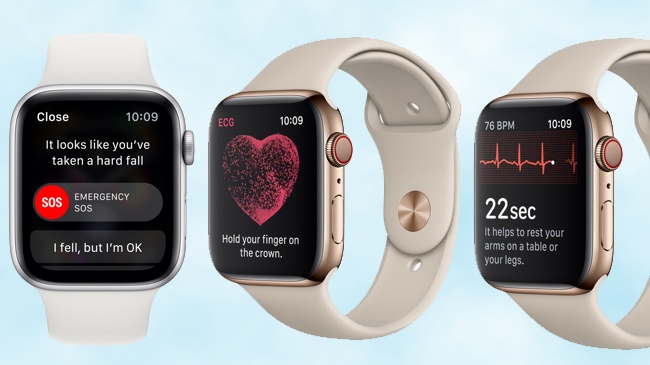Apple – Transforming the future of Healthcare

Having changed entire industries ranging from Music to Telecommunications, will Apple transform the healthcare industry as well?
In 2007 Apple has released the iPhone, changing the way we interact with our mobile phones forever, and over the last 11 years grew to a market size of more than $1 trillion [1]. But in recent years, the growth of the smartphone industry has become stagnant, achieving 0% growth in 2017 [2].
To address this problem, and continue its growth, Apple has decided to position itself to expand into the $3 trillion US healthcare market [3]. Where the mobile health solution market alone (mHealth) – of which health apps account for roughly 20% — is expected to grow at an annualized rate of 33.4% through 2020, reaching $59.2 billion [4].
As Apple moves to disrupt the HealthCare market, leveraging machine learning and distributed innovation (content generation) is becoming a key aspect of its strategy. First, Apple needs to collect a vast amount of health-related data from its users that is required for machine learning algorithms. To obtain this goal, Apple has decided to leverage its wearable segment. In 2015 Apple released the “Apple watch” that by the 4’th quarter of 2017 has reached sales of 8 million units per quarter – more than the whole Swiss watch industry combined. This strong market penetration gives Apple more access to data than any other wearable company ever before [5]. Secondly, Apple needs to analyze the data in order to produce better predictions. In 2015, Apple released its Research Kit to allow medical researchers to develop apps that provide medical information to individuals and collect data from users that can then be used to develop future treatments [6]. In 2016, Apple released its CareKit, an open source software framework enabling developers to build apps that help patients actively manage their medical conditions [7]. By releasing these Kits and improving them constantly, Apple is able to leverage the community to create content. The Kits are providing a platform for third party developers to create applications that use machine learning algorithms without having to develop the actual mechanism that operates “under the hood”.

To stay ahead of the competition and address this strategy in the short term, Apple has created agreements with 13 Health care systems that allow it (with patient permission) to download onto its devices the electronic health records (EHR) of those systems, thus allowing Apple and third parties to create useful services for those patients. The company is working to create even more agreements with other health care system to increase its reach [8]. Secondly, Apple has added more sensors to its Apple watch to increase the amount of data it receives from users. The first model (Series 1) had only a heart rate sensor and allowed the collection of only the heart rate data [9]. Whereas the newest watch (Series 4), released in 2018, allows a user to take a medically accurate electrocardiogram, a test of a person’s heart rhythm that can help detect dangerous health conditions, and even detect when its owner has taken a fall (aimed at the elderly population) [10].

Source: www.healthcareitnews.com
In the medium term, Apple has put emphasis on developing dedicated hardware to support running machine learning algorithms on its chips that reside in most Apple products, from the iPhone to the Apple watch. The dedicated hardware accelerates the run time of those algorithms and creates an advantage compared to its competitors [11].
Taking Apple’s challenges in consideration I would propose it focuses on the following actions on the short term: First, the Apple watch adoption in the general population is a critical part of its strategy. Apple needs to concentrate on improving the features of the Apple watch, in order to increase its adoption rate, this can be done by increasing its user experience in providing notifications, reading texts, having better activity tracking and improving its battery life [12]. Secondly, Apple should put an extreme focus on the privacy and the security of the users’ data. Health-related data is very sensitive, one major leak could potentially discourage users from sharing its health data with Apple, making its efforts obsolete.
On the medium term, the huge success of the iPhone was facilitated by the sheer amount of apps it had available to the end user. Increasing the involvement of the community of developers and leveraging them to create more quality application using the CareKit by providing incentives for developing applications focused on health will help Apple have dominance over its competitors.
As I think about Apple’s challenges, a few questions remain. Will users trust third party application with their Health information? Should Apple primary focus now be on pursuing more partnerships or on creating valuable content with the healthcare partners it has to provide quality insights to its users?
[Word count = 775]
Sources
[1] Salinas, Sara. 2018. “Apple Hangs Onto Its Historic $1 Trillion Market Cap”. CNBC. https://www.cnbc.com/2018/08/02/apple-hits-1-trillion-in-market-value.html.
[2] Mangalindan, JP. 2018. “Global Smartphone Shipments Had 0% Growth In 2017”. Finance.Yahoo.Com. https://finance.yahoo.com/news/global-smartphone-shipments-0-growth-2017-184321789.html.
[3] Stanway-Williams, Caitlin. 2018. “Apple Expands Further Into The US Healthcare Market | Articles | Chief Data Officer”. Channels.Theinnovationenterprise.Com. https://channels.theinnovationenterprise.com/articles/apple-expands-further-into-the-us-healthcare-market.
[4] Intelligence, BI. 2018. “Apple Fortifies Carekit Security”. Business Insider. https://www.businessinsider.com/apple-fortifies-carekit-security-2017-1.
[5] Leswing, Kif. 2018. “Apple Sold More Watches Than Rolex, Swatch, And The Rest Of The Swiss Watch Industry Combined”. Business Insider. https://www.businessinsider.com/apple-outsold-the-entire-swiss-watch-industry-in-2017-2018-2.
[6] Loria, Kevin. 2018. “Apple Is Ushering In A ‘New Era’ Of Medical Research”. Business Insider. https://www.businessinsider.com/apple-researchkit-could-transform-medical-research-2015-3.
[7] “Researchkit And Carekit”. 2018. Apple. https://www.apple.com/researchkit/.
[8] Blumenthal, David, and Aneesh Chopra. 2018. “Apple’S Pact With 13 Health Care Systems Might Actually Disrupt The Industry”. Harvard Business Review. https://hbr.org/2018/03/apples-pact-with-13-health-care-systems-might-actually-disrupt-the-industry.
[9] “Apple Watch Series 1 – Technical Specifications”. 2018. Support.Apple.Com. https://support.apple.com/kb/sp745?locale=en_US.
[10] Manjoo, Farhad. 2018. “The Week In Tech: Apple’S Watch Steals The Show”. Nytimes.Com. https://www.nytimes.com/2018/09/14/technology/the-week-in-tech-apples-watch-steals-the-show.html.
[11] Tilley, Aaron. 2018. “Apple Is Following Google Into Making A Custom AI Chip”. Forbes. https://www.forbes.com/sites/aarontilley/2017/05/26/apple-ai-chip/#192ff8bc154f.
[12] Cakebread, Caroline. 2018. “Here’s How People Are Using Their Smartwatches”. Business Insider. https://www.businessinsider.com/most-used-smartwatch-features-chart-2017-8.



With regards to your recommendation, while I agree that the Apple watch adoption is a critical piece, I think the limiting factor is not so much around the lack of attractive services as you pointed out, but on the sheer cost (300-400 dollars). Therefore, I think Apple should either reduce the cost or find better way to reach to the customers who can afford the watch.
In terms of your question at the end, I believe Apple should be working more on quality of the apps by creating valuable content, rather than increasing the number of partnership. In order to gather enough data to improve its machine learning capability, Apple should be focusing on getting information in a consistent manner, rather than collecting heterogeneous data from different apps.